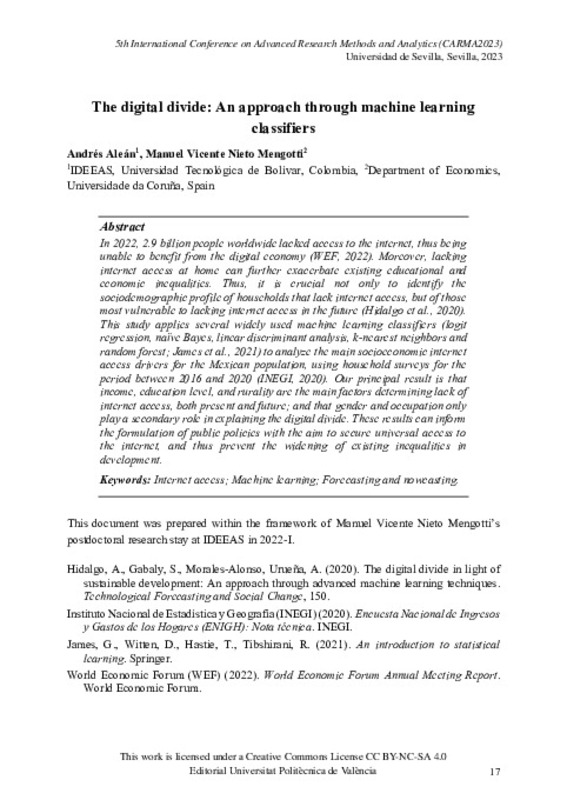JavaScript is disabled for your browser. Some features of this site may not work without it.
Buscar en RiuNet
Listar
Mi cuenta
Estadísticas
Ayuda RiuNet
Admin. UPV
The digital divide: An approach through machine learning classifiers
Mostrar el registro sencillo del ítem
Ficheros en el ítem
| dc.contributor.author | Aleán, Andrés
|
es_ES |
| dc.contributor.author | Nieto Mengotti, Manuel
|
es_ES |
| dc.date.accessioned | 2024-01-11T07:36:10Z | |
| dc.date.available | 2024-01-11T07:36:10Z | |
| dc.date.issued | 2023-09-22 | |
| dc.identifier.isbn | 9788413960869 | |
| dc.identifier.uri | http://hdl.handle.net/10251/201753 | |
| dc.description.abstract | [EN] In 2022, 2.9 billion people worldwide lacked access to the internet, thus being unable to benefit from the digital economy (WEF, 2022). Moreover, lacking internet access at home can further exacerbate existing educational and economic inequalities. Thus, it is crucial not only to identify the sociodemographic profile of households that lack internet access, but of those most vulnerable to lacking internet access in the future (Hidalgo et al., 2020). This study applies several widely used machine learning classifiers (logit regression, naïve Bayes, linear discriminant analysis, k-nearest neighbors and random forest; James et al., 2021) to analyze the main socioeconomic internet access drivers for the Mexican population, using household surveys for the period between 2016 and 2020 (INEGI, 2020). Our principal result is that income, education level, and rurality are the main factors determining lack of internet access, both present and future; and that gender and occupation only play a secondary role in explaining the digital divide. These results can inform the formulation of public policies with the aim to secure universal access to the internet, and thus prevent the widening of existing inequalities in development. | es_ES |
| dc.language | Inglés | es_ES |
| dc.publisher | Editorial Universitat Politècnica de València | es_ES |
| dc.relation.ispartof | 5th International Conference on Advanced Research Methods and Analytics (CARMA 2023) | |
| dc.rights | Reconocimiento - No comercial - Compartir igual (by-nc-sa) | es_ES |
| dc.subject | Internet access | es_ES |
| dc.subject | Machine learning | es_ES |
| dc.subject | Forecasting and nowcasting | es_ES |
| dc.title | The digital divide: An approach through machine learning classifiers | es_ES |
| dc.type | Capítulo de libro | es_ES |
| dc.type | Comunicación en congreso | es_ES |
| dc.rights.accessRights | Abierto | es_ES |
| dc.description.bibliographicCitation | Aleán, A.; Nieto Mengotti, M. (2023). The digital divide: An approach through machine learning classifiers. Editorial Universitat Politècnica de València. 17-18. http://hdl.handle.net/10251/201753 | es_ES |
| dc.description.accrualMethod | OCS | es_ES |
| dc.relation.conferencename | CARMA 2023 - 5th International Conference on Advanced Research Methods and Analytics | es_ES |
| dc.relation.conferencedate | Junio 28-30, 2023 | es_ES |
| dc.relation.conferenceplace | Sevilla, España | es_ES |
| dc.relation.publisherversion | http://ocs.editorial.upv.es/index.php/CARMA/CARMA2023/paper/view/16490 | es_ES |
| dc.description.upvformatpinicio | 17 | es_ES |
| dc.description.upvformatpfin | 18 | es_ES |
| dc.type.version | info:eu-repo/semantics/publishedVersion | es_ES |
| dc.relation.pasarela | OCS\16490 | es_ES |






